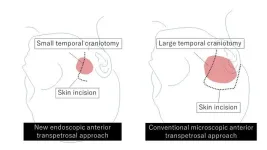(Press-News.org) Like most primates, humans are remarkably touchy-feely. Starved of touch, we release more of the stress hormone cortisol, which causes the immune system to be down-regulated and the heart rate and blood pressure to go up. On the other hand, touch causes the brain to be flooded by natural opioids, the ‘bonding hormone’ oxytocin, and the ‘feel-good’ neurotransmitters dopamine and serotonin.
It is generally assumed that our sense of touch worsens with age, just like our vision and sense of hearing. However, new results are good news for those who wished they could stave off age-related decline forever: they show for the first time that a deterioration in touch sensitivity only happens in regions of the body with hairless skin, but not in more hairy regions. The results are published in Frontiers in Aging Neuroscience.
“Touch gets worse on the hands with age, but not on our hairy arms and cheeks, of which the cheek is especially sensitive to touch,” said Dr Jean-Marc Aimonetti, a researcher at the Research Center in Psychology and Neurosciences, in Marseille, France, and one of the corresponding authors.
Testing sensitivity
The authors recruited 96 left-handed female volunteers between 20 and 75 years old and tested the sensitivity of their skin in three regions: the hairless tip of the right index finger, and the right forearm and cheek, which are typically both covered in a downy layer of hair. The women sat down in a quiet room, closing their eyes and wearing noise-canceling headphones to avoid distractions.
In the first experiment, the subjects had to blindly move the tip of their right index finger over a series of 11 plates with differently spaced grooves, between 3.6mm and 6mm wide. They had to indicate whether the grooves felt wider or narrower than those on a reference plate, 4.8mm wide. Each subject was tested 132 times, and received a score for correct responses. The results confirmed that the index finger’s sensitivity for spatial exploration through touch decreases with age.
In a similar, second experiment, the researchers applied 13 classes of monofilaments (each with a unique calibrated force between 0.08 and 75 millinewton) to the women’s skin in a randomized, dose de-escalating pattern. The subjects had to indicate whenever they sensed a touch. This experiment ended when a subject made two successive errors, indicating that she could no longer accurately detect the stimulus. This is a widely used, proven method for measuring touch sensitivity, for example in people with neuropathy from diabetes.
The results again confirmed that the detection threshold increased linearly with age for the index finger, thus showing a deterioration of touch sensitivity over the lifespan.
Keeping in touch
However, unexpectedly, no such deterioration was found for the cheek and forearm. For example, the ten youngest women had a mean detection threshold of 5.6 millinewton on the forearm, compared to a mean of 5.6 millinewton for the ten oldest women – a difference that was not statistically significant. Likewise, the mean threshold on the cheek was 0.9 millinewton for the 10 youngest women, not significantly lower than the mean of 1.1 millinewton for the ten oldest.
These results imply that the cheek remains especially responsive throughout the lifespan. This was a surprise, as hairless skin generally has a higher density of mechanoreceptors– that determine our sensitivity to touch – than hairy skin.
“Although our hands are very important for touch, we receive caresses from others more on our hairy skin. This so-called affective touch actually increases with age and preserving this sensitivity would make sense, as we are social animals,” said Aimonetti’s colleague Dr Rochelle Ackerley, the second corresponding author.
Hair is our friend
The researchers speculate that the preservation of touch sensitivity in the forearm and cheek is directly due to the presence of hairs. Hair doesn’t only protect the skin, but also acts as an antenna to transmit mechanical stimuli, including at very low forces.
“Hair is our friend. It protects us from bacteria and tell us which way the wind is blowing. It's not for nothing that we have hair in the most sensitive areas” explained Aimonetti.
But what can we do ourselves to keep our skin sensitive?
“Studies show that people exposed throughout their lives to thermal environmental extremes, such as the cold for soldiers or the heat for bakers, lose more tactile sensitivity. We can also avoid negative lifestyle factors such as alcohol, tobacco, and sun bathing, which damage the skin, as well as other factors, such as pollution,” said Ackerley.
END
Study shows hairy skin does not become less sensitive with age
Our cheeks remain exceptionally sensitive to touch throughout our lifespan
2024-07-02
ELSE PRESS RELEASES FROM THIS DATE:
Safer, swifter, smaller scar: new brain surgery approach targets difficult tumors at skull base
2024-07-02
Tumors arising in the base of the skull are among the most difficult to remove in neurosurgery. The current treatment method is to perform surgical removal by what is known as the microscopic anterior transpetrosal approach (ATPA). Seeking to lessen the risk of damage and postoperative complications, as the skull base is densely packed with nerves, blood vessels, and other tissues, not to mention the brain stem, an Osaka Metropolitan University medical research team is taking a new approach.
Led by Dr. Hiroki Morisako, a lecturer in ...
Barriers to care: transgender and gender-diverse peoples’ health care experiences
2024-07-02
Transgender, nonbinary, and gender-diverse people face barriers to accessing surgery and to the health system in general, describe authors in two new research papers published in CMAJ (Canadian Medical Association Journal).
In many areas of life, people who identify as transgender, nonbinary, and gender diverse experience discrimination even where there are laws to protect transgender human rights. Health systems also pose barriers for transgender, nonbinary, and gender-diverse people, who are more likely to delay obtaining ...
Study explores what motivates people to watch footage of disasters and extreme weather
2024-07-02
Extreme weather events such as hurricanes and storms have increased in both frequency and severity in recent years.
With that has come heightened public interest, resulting in often dramatic footage being live-streamed on platforms such as YouTube, TikTok and Discord.
Now, a new study conducted at the University of Plymouth has for the first time analysed what might be motivating people to watch these streams – in some instances for up to 12 hours at a time.
The research centred around the live-streaming ...
Ocean acidification turns fish off coral reefs
2024-07-02
A new study of coral reefs in Papua New Guinea shows ocean acidification simplifies coral structure, making crucial habitat less appealing to certain fish species.
While much media attention has focused on heat stress-induced coral bleaching, this finding, by a University of Adelaide research team led by Professor Ivan Nagelkerken, adds nuance to concerns about how global warming affects coral reefs.
Ocean acidification is caused by an increase in the level of carbon dioxide in oceanwater, leading to a reduction in pH. This makes calcium carbonate less available in the ocean, which corals use to build and repair their skeleton.
Professor Nagelkerken and ...
Will the Paris 2024 Olympics be a platform for activist protests amid global tensions?
2024-07-02
Athletes and sporting teams have frequently used the Olympics and other sporting events to make political statements through boycotts and protests. Ahead of the Paris Olympics kicking off this month and amidst the current UEFA (Union of European Football Associations) European Football Championship (Euro 2024), researchers are asking – should sport be a platform for promoting social justice issues?
The 2024 Paris Olympics, like the Euro 2024 soccer tournament, will be watched by billions of people and command media attention around the globe. ...
Mechanism of lupus pathogenesis unveiled
2024-07-02
A research team of Professor Yoontae Lee and Jiho Park, a PhD candidate, from the Department of Life Sciences at Pohang University of Science and Technology (POSTECH) recently discovered that a particular protein promotes the development of systemic lupus erythematosus (SLE). The study was published in the Proceedings of the National Academy of Sciences of the United States of America (PNAS), one of the world's most-cited multidisciplinary scientific journal.
B cells, components of the body's ...
How well do deep-sea animals perform under pressure?
2024-07-02
A multi-institutional team that includes researchers from the University of Delaware, University of California San Diego and Monterey Bay Aquarium Research Institute (MBARI), among others, published a paper in Science on Thursday, June 27, that provides new insight on how deep-sea “comb jellies” called ctenophores adapt and survive at extreme pressures.
It turns out that part of the adaptation involves lipids, fatty chemical compounds found in the membrane of all living cells that perform essential functions, including storing energy, sending signals and controlling what passes through ...
FDA staff leaving for industry jobs given “behind the scenes” lobbying advice
2024-07-02
The US Food and Drug Administration (FDA) tells staff leaving for industry jobs that, despite restrictions on post-employment lobbying, they are still permitted to influence the agency, reveals an investigation by The BMJ today.
Internal emails, obtained under a freedom of information request, show how two FDA officials who worked on covid-19 vaccine approvals were proactively informed by FDA ethics staff about their ability to indirectly lobby the agency as they left for jobs with Moderna.
The record shows that since 2000 every FDA commissioner, the agency’s highest position, has gone on to work ...
Herpes infections take major economic toll globally, new research shows
2024-07-02
Genital herpes infections and their related complications lead to billions of dollars in health care expenditures and productivity losses globally, according to the first ever global estimates of the economic costs of these conditions.
The paper, which publishes July 1st in the journal BMC Global and Public Health, calls for greater investment in prevention of herpes transmission, including concerted efforts to develop effective vaccines against this common virus.
Corresponding author Nathorn Chaiyakunapruk, PharmD, PhD, professor of pharmacotherapy, and Haeseon Lee, PharmD, research fellow in pharmacotherapy, both at the College of Pharmacy of University ...
Tax on antibiotics could help tackle threat of drug-resistance
2024-07-02
Taxing certain antibiotics could help efforts to tackle the escalating threat of antibiotic resistance in humans, according to a new study by the University of East Anglia’s Centre for Competition Policy, Loughborough University and E.CA Economics.
Antimicrobial resistance (AMR) poses a significant global risk, causing an estimated 700,000 deaths annually. A key AMR report previously warned that if unchecked, it could endanger 10 million lives a year and result in $100 trillion in lost economic output ...
LAST 30 PRESS RELEASES:
Start school later, sleep longer, learn better
Many nations underestimate greenhouse emissions from wastewater systems, but the lapse is fixable
The Lancet: New weight loss pill leads to greater blood sugar control and weight loss for people with diabetes than current oral GLP-1, phase 3 trial finds
Pediatric investigation study highlights two-way association between teen fitness and confidence
Researchers develop cognitive tool kit enabling early Alzheimer's detection in Mandarin Chinese
New book captures hidden toll of immigration enforcement on families
New record: Laser cuts bone deeper than before
Heart attack deaths rose between 2011 and 2022 among adults younger than age 55
Will melting glaciers slow climate change? A prevailing theory is on shaky ground
New treatment may dramatically improve survival for those with deadly brain cancer
Here we grow: chondrocytes’ behavior reveals novel targets for bone growth disorders
Leaping puddles create new rules for water physics
Scientists identify key protein that stops malaria parasite growth
Wildfire smoke linked to rise in violent assaults, new 11-year study finds
New technology could use sunlight to break down ‘forever chemicals’
Green hydrogen without forever chemicals and iridium
Billion-DKK grant for research in green transformation of the built environment
For solar power to truly provide affordable energy access, we need to deploy it better
Middle-aged men are most vulnerable to faster aging due to ‘forever chemicals’
Starving cancer: Nutrient deprivation effects on synovial sarcoma
Speaking from the heart: Study identifies key concerns of parenting with an early-onset cardiovascular condition
From the Late Bronze Age to today - Old Irish Goat carries 3,000 years of Irish history
Emerging class of antibiotics to tackle global tuberculosis crisis
Researchers create distortion-resistant energy materials to improve lithium-ion batteries
Scientists create the most detailed molecular map to date of the developing Down syndrome brain
Nutrient uptake gets to the root of roots
Aspirin not a quick fix for preventing bowel cancer
HPV vaccination provides “sustained protection” against cervical cancer
Many post-authorization studies fail to comply with public disclosure rules
GLP-1 drugs combined with healthy lifestyle habits linked with reduced cardiovascular risk among diabetes patients
[Press-News.org] Study shows hairy skin does not become less sensitive with ageOur cheeks remain exceptionally sensitive to touch throughout our lifespan





